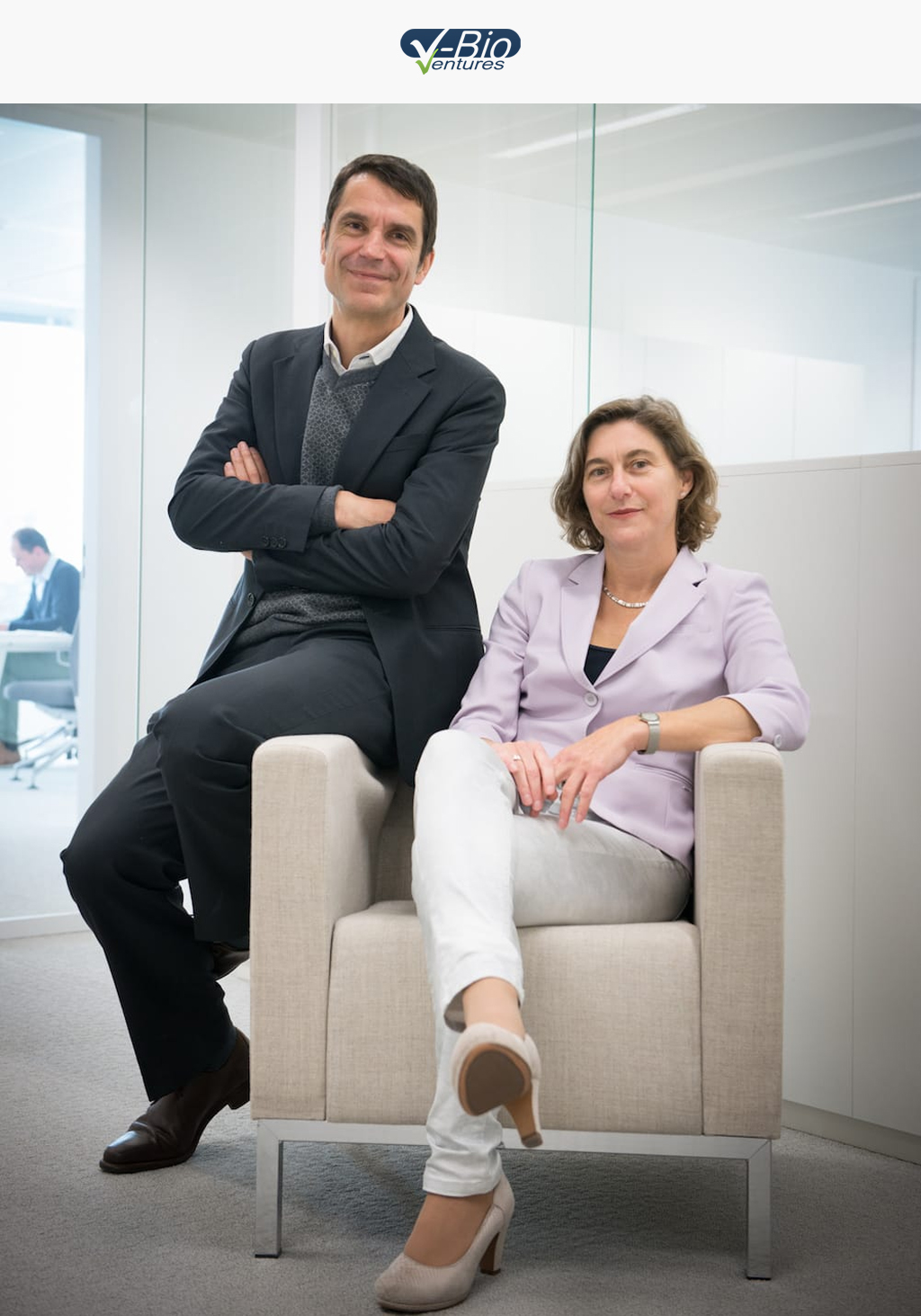V-Bio Ventures, the new Belgian fund for life sciences startups, is currently being managed by Christina Takke and Willem Broekaert. They both have a life sciences background and gained experience in finance before setting up this new fund. In this interview, they share with us their role in the fund, their view on the life sciences investment market, their personal ambitions and some good advice for starters.
Christina Takke studied biology in Germany, after which she obtained a PhD in Developmental Biology. She started her career in the non-profit sector at BioGenTech-NRW, where she evaluated business ideas and patent applications. Next, she moved to ABN AMRO to assess venture capital investments in life sciences, and she then continued this work at Forbion, a spin-off from ABN AMRO. Takke: “I am passionate about turning science into products. Education and research are to a large extent supported by public funding; therefore, it is important to focus investments on innovations that are highly relevant to society. V-Bio Ventures, as an independent investment fund, will play an important role in this respect.”
It is important to focus investments on innovations that are highly relevant to society.
Willem Broekaert is Professor at the KU Leuven in plant biotechnology. During the initial phase of his career, he performed fundamental research, but without losing his focus on applicability. He took part in the foundation of several spin-offs, supported by venture capital, such as CropDesign and Fugeia. Broekaert: “I am on the other side now when it comes to investments. During my career, I gained experience on how to select projects that are worth investing into. I feel privileged to be able to give the necessary support and chances to promising teams.”
What are the conditions for a startup to get funding from V-Bio Ventures?
Takke: “The company needs to be active in the field of therapeutics, diagnostics or green biotech in an early developmental phase. We verify the scientific support, such as publications in renowned journals. Often, startups are based on an innovative technology or platform and need money for the preclinical research and to collect confirmatory data. We help these companies to create a viable business plan, and provide mentoring and coaching to the young management team. When we fund a company, we become co-owner and continue contributing to the business by taking a seat on the board of directors.”
V-Bio Ventures was founded by the VIB. What does this connection mean in practice?
Broekaert: “A substantial part of the financial resources will be invested in VIB-related projects, either in direct VIB spin-outs or in projects for which we see a relevant cooperation or synergy with a VIB technology. Next to the VIB-related opportunities, the fund will also invest in promising projects derived from other sources without a particular link to VIB.”
Why is B-Vio Ventures also investing in foreign companies?
Broekaert: “The supply of new dossiers has to be vast, because we only want to invest in the best projects. We need many applications to be able to compare them and subsequently pick the best options.”
Takke: “By also looking abroad for new investments, we establish contacts with foreign investors, and reciprocally this can help to turn their attention to Belgium. In this way we aim to reinforce the local financial ecosystem and foster long-term growth. But first, we want to create a strong portfolio, a solid team and establish our name.”
Is it a smart choice for companies to install themselves in Belgium?
Broekaert: “I think it is. Compared to other countries such as The Netherlands, France and Germany, Belgium has a stronger biotech industry when measured on a per capita basis. On the one hand, this might make you think that the competition here would be too strong. But on the other hand, you might also look at our biotech industry as a self-reinforcing network. In Belgium, there are many people in biotech with a lot of experience in management, but also technical experts, IP specialists and regulatory professionals. Furthermore, the sector strongly benefits from the support of governmental institutions.”
You might also look at our biotech industry as a self-reinforcing network.
Takke: “Although Belgium is performing very well compared to other regions, the financial support for biotech startups is, in our opinion, not yet strong enough. For example, the amount of money that biotech startups in Scandinavia and Switzerland are able to raise is still higher. But we’re heading in the right direction, as more funds for startups, such as ours, are becoming available. Also, the strong biotech cluster here, as my colleague just mentioned, is very valuable.”
Are you also investing in the fund?
Broekaert: “Currently, Christina and I are managing V-Bio Ventures, but the team will grow to 5 people in the future. The management team personally contributes to the financial resources of the fund. We are pleased to make this commitment, because in this way we are aligned with our investors, and this ensures that we invest in opportunities in which we truly believe ourselves.”
What is your advice for starters?
Takke: “It is very important to know what your Unique Selling Points (USPs) are and how you can protect your market position and your IP. Next, you should openly discuss your idea with potential clients, people with whom you will cooperate and everyone who wants to hear about it.
Don’t stay in your ivory tower.
Companies can contact us via our website, by phone or meet us on conferences. You can also just call us for feedback. Get in touch with us and we will brainstorm with you. You might have an idea and maybe we see an opportunity to develop it, perhaps in combination with something else. One plus one is three. Don’t stay in your ivory tower.”


